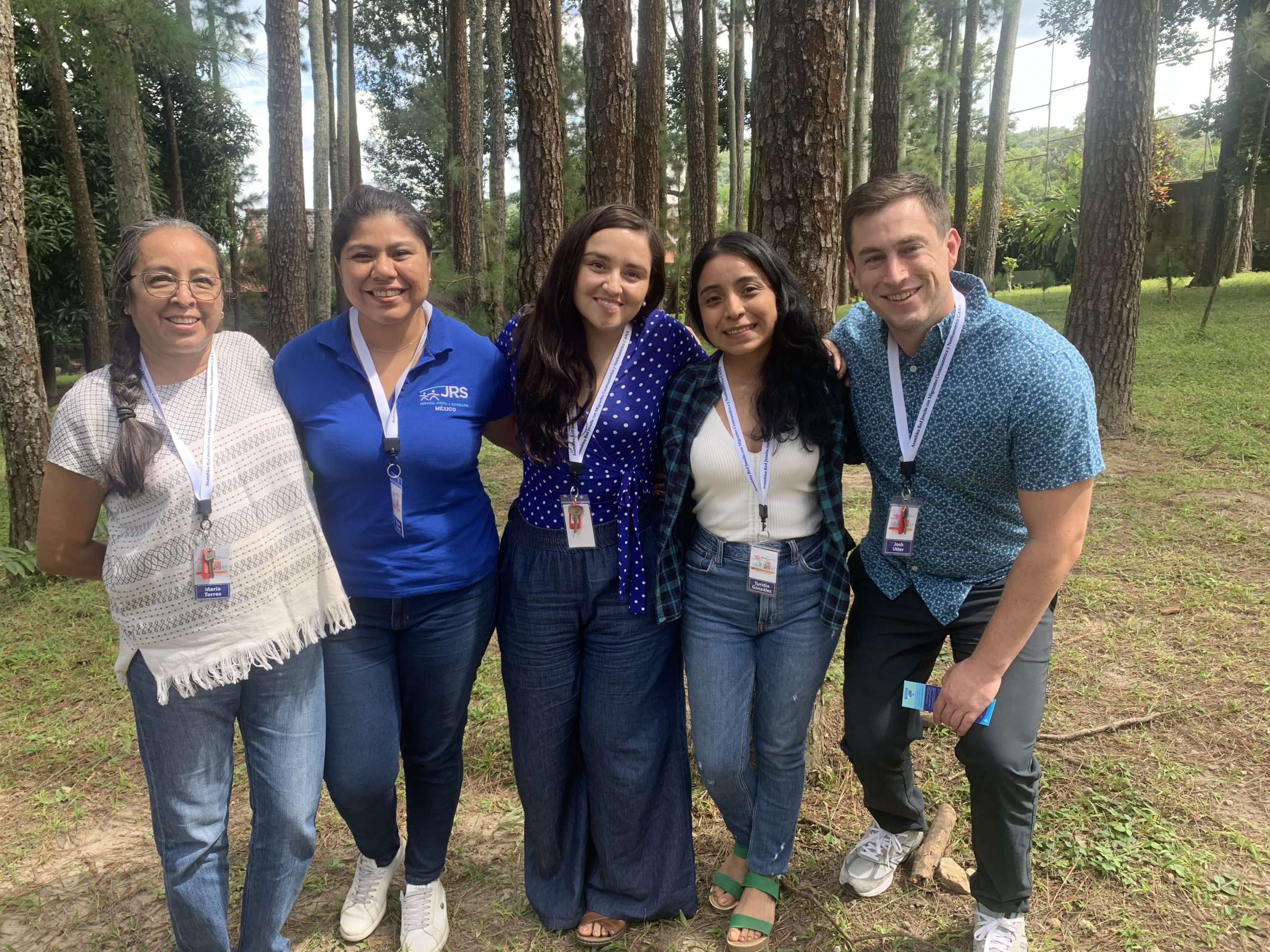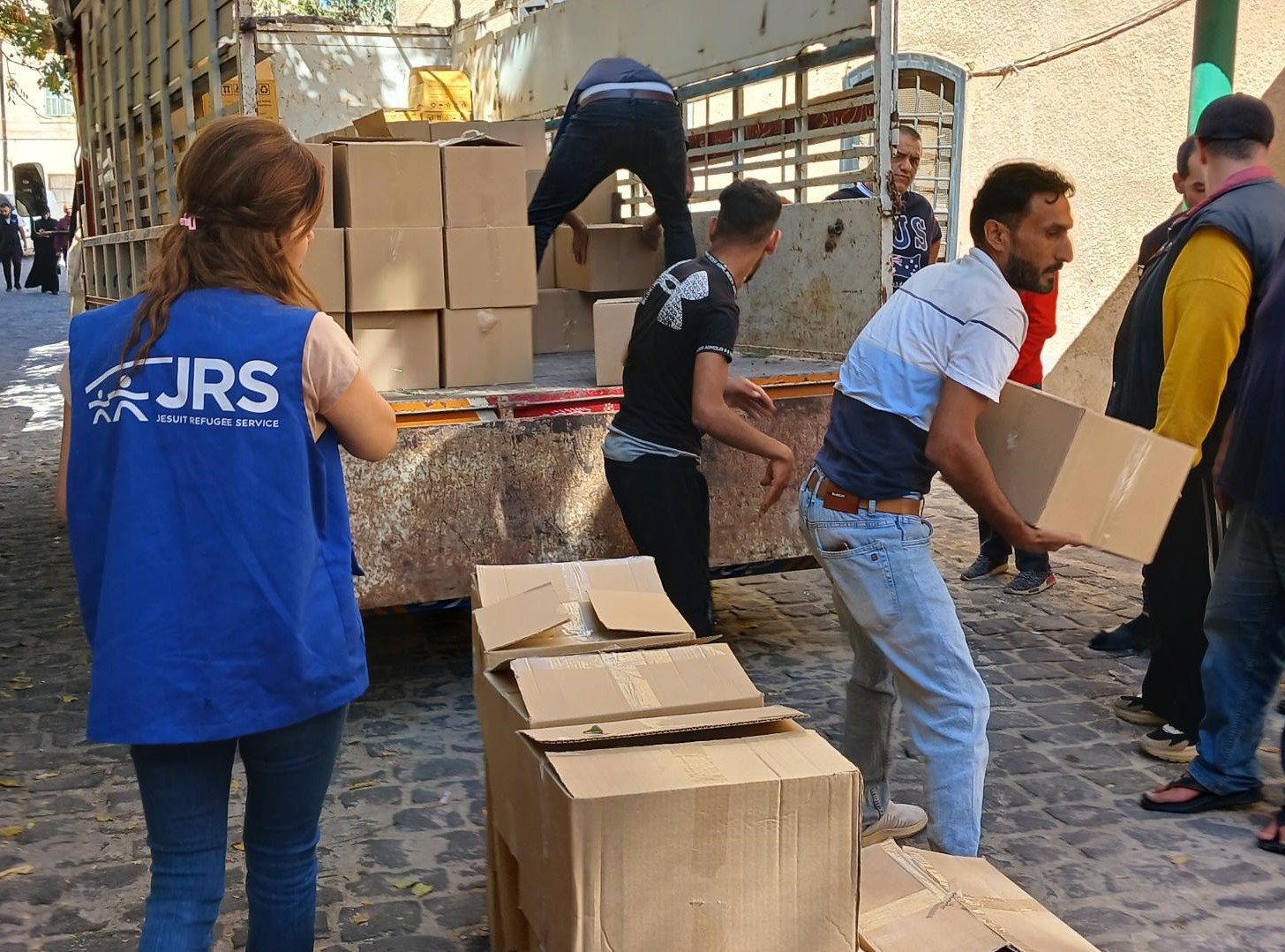America Magazine: How Jesuit Refugee Service is responding to the Trump foreign aid freeze
15 February 2025|Kevin Clarke - America Magazine
Written and published by America Magazine
Two weeks after a series of memos and executive orders from the Trump administration threw U.S.-sponsored humanitarian programs around the world into disarray, critical programs aimed at mitigating the worst effects of poverty and conflict are shutting down.
Essentially the entire U.S.A.I.D. workforce—10,000 people—has been furloughed or fired, and staff overseas ordered to return home. The Associated Press reports the White House plan is to reduce the agency’s staff to less than 300 people. U.S.A.I.D. programs have served millions of the world’s most vulnerable people in more than 170 countries around the world.
The abrupt termination of U.S.A.I.D. and a 90-day freeze on most foreign aid ordered by President Donald Trump were deplored by Alistair Dutton, the secretary general of Caritas Internationalis, the umbrella organization in Rome for 162 Catholic charities working in more than 200 countries. He charged in a statement released on Feb. 10 that the halt to the work of U.S.A.I.D. “will kill millions of people and condemn hundreds of millions more to lives of dehumanising poverty.”
Lives in the balance
“This is an inhumane affront to people’s God-given human dignity, that will cause immense suffering,” he said. “Killing USAID also presents massive challenges for all of us in the global humanitarian community, who will have to completely reassess whom we can continue to serve and how.”
“The lives and dignity of millions hang in the balance,” Mr. Dutton said, calling on other governments and stakeholders “to speak out and strongly urge the U.S. Administration to reverse these dangerous measures.” Though other nations donate more to foreign assistance on a per capita basis, the United States has historically been the world’s leading humanitarian donor, representing $4 out of every $10 in aid accounted for by the United Nations in recent years.
According to a final report from the U.S.A.I.D. Inspector General Paul Martin—who was abruptly terminated following its release on Feb. 10—the administrative collapse of U.S.A.I.D, a federal agency mandated and funded by Congress, has made it impossible to monitor more than “$8.2 billion in obligated but undisbursed humanitarian assistance funds,” including food, medical and other humanitarian aid in transit or abandoned and at risk of spoilage in warehouses around the world.
As the Trump administration’s unraveling of U.S.A.I.D. accelerated in February, Catholic Relief Services warned its staff to anticipate drastic workforce reductions, according to a report in The National Catholic Reporter. U.S.A.I.D.-funded programs accounted for nearly half of the U.S. church’s relief and development agency’s $1.2 billion budget in 2023.
The foreign aid freeze also affects programs administered by Jesuit Refugee Service. Its work with refugees around the world has been supported by the State Department’s Bureau of Population, Refugees and Migrants. J.R.S. had been anticipating about $18 million from that agency in 2025 to pay for programs in Iraq, Chad, South Sudan, Colombia and other nations where refugees have sought protection and assistance.
“Every administration should carefully look at how it spends its money,” J.R.S. President Kelly Ryan said in an interview with America. “I will be the first to say that there are probably things in the foreign assistance budget that should be cropped and should be reformed.”
But a wholesale shutdown of overseas programs, she argued, is both unwarranted and detrimental to U.S. interests. “The idea that we should become isolationists, I think that’s a mistake.”
“Since the Second World War, all of our foreign assistance has advanced U.S. interests by creating peace and security,” Ms. Ryan said. “And that’s a greater good for the world too. It’s advancing the common good.”
Responding to widespread appeals to keep critical humanitarian aid moving, Secretary of State Marco Rubio said his office would begin issuing waivers for “life-saving programs.” J.R.S. is among the many humanitarian agencies now lining up for those waivers to continue at least some of its work.
“Right now, we’re looking to raise between one and two million dollars [to get J.R.S. programs through the 90-day freeze],” Ms. Ryan said. “Our hope is we will get the [State Department] money, but we want to continue the life-saving activity right now and not turn off the lights.”
According to a J.R.S. statement, the Trump administration’s aid halt is affecting “103,000-plus refugees and other forcibly displaced people” directly and perhaps another 300,000 people indirectly. About 400 J.R.S. staff members around the world have already been laid off.
Information deficits
Public apprehension and misunderstanding about the effectiveness and importance of foreign aid has become apparent in social media discussions of the president’s shock-and-awe campaign against U.S.A.I.D. Ms. Ryan pointed out that misinformation about foreign aid is not exactly a new problem, but contemporary social media has clearly accelerated its dissemination. Fraudulent reports have led to broad attacks by social media users on the work of J.R.S. and other overseas agencies.
“It’s a highly political time, and it’s unfortunate people don’t have the full information about the value of foreign assistance,” Ms. Ryan said. “Polling data show that Americans are unaware that foreign assistance is less than 1 percent of the federal budget. When they become aware of that, their support for it grows considerably,” she said.
“And when they learn what foreign assistance does—whether it’s life-saving medical interventions, including [responding to] Ebola or treating children [with] pediatric AIDS—their hearts and pocketbooks are open. They want to fund this.”
“What we have to do is tell the stories of successful foreign assistance like the PEPFAR program,” she said, referring to the President’s Emergency Plan for AIDS Relief. “There are 27 million lives that have been saved because of that program. It’s a remarkable achievement.”
Controversy over the foreign aid clampdown inspired a unique evaluation of the spiritual underpinnings of U.S.-sponsored interventions in other countries aimed at mitigating disease, poverty and hunger. Vice President JD Vance’s attempt to explain cuts to foreign assistance as justified in Catholic teaching by ordo amoris—a theological concept he suggested meant that love and attention be paid first to family, neighbor and community before others—drew a rebuke from Pope Francis himself.
“Christian love is not a concentric expansion of interests that little by little extend to other persons and groups,” the pope wrote in a letter to U.S. bishops on Feb. 10 that did not refer to Mr. Vance by name. “The human person is a subject with dignity who, through the constitutive relationship with all, especially with the poorest, can gradually mature in his identity and vocation. The true ordo amoris that must be promoted is that which we discover by meditating constantly on the parable of the ‘Good Samaritan’ (Lk 10:25-37), that is, by meditating on the love that builds a fraternity open to all, without exception.” The contrasting statements from perhaps two of the world’s most prominent Catholics drew global interest. For her part, Ms. Ryan perceives neither theological nor practical obstacles to extending humanitarian outreach beyond U.S. borders.
She noted that Catholic teaching on solidarity, subsidiarity and the primacy of the common good are the foundation of a powerful moral call to support humanitarian assistance overseas. At the same time, she acknowledged that there are “no shortage of problems” at home that require attention.
“I don’t think it is an either/or,” Ms. Ryan said. “Obviously, we have to take care of the problems in the United States.” But, she continued, “as the richest country in the world, the most powerful country in the world and the country that has been a leader on humanitarian and development assistance since the Marshall Plan, [we cannot] turn our backs on those who need us.”
“And,” she warned, “if we do that, there will be rival forces and people and governments and non-governments that will fill that void, that will not advance U.S. interests, whether it’s China, Russia, Wahhabism, whatever it is. It’s not advantageous for the United States to step back from the wonderful work that we’ve been able to accomplish.”
She added that the public-private partnership represented by U.S. agencies collaborating with church-based and other nongovernment actors is a source of strength and effectiveness in humanitarian service, not a cause for suspicion.
J.R.S. assists more than 1 million people annually around the world, according to Ms. Ryan. Its programs, she said, are a lifeline to “marginalized communities at the very edge.”
Among them: children with severe disabilities in South Sudan “who would be bullied or harmed…if they were not able to have that safe space” for their education; refugees driven into Thailand because of the ongoing conflict in Myanmar; and Yazidi and Christian communities struggling to re-establish themselves in Nineveh Province in northern Iraq.
“The work is just going to stop in places like South Africa, where we won’t visit the dying. We won’t be able to get the medicines out in Iraq.… In Chad, the work we’re doing is in education, [reaching] tens of thousands of kids, but it’s also the teachers from the community who will no longer have a paycheck in order to be able to support themselves and have independence.”
Each place is a little different, and each [program] is very, very valuable.” Ms. Ryan also points out that J.R.S. is one of the few humanitarian organizations assisting Rohingya Muslims from Myanmar and other refugees who escaped into Bangladesh and India escaping intercommuncal violence in 2017.
“We go to places other NGOs won’t go, and we need support to do that,” Ms. Ryan said. “Nobody else is in the Nineveh Plainshelping the Yazidis and the Christians who’ve been terrorized by extremists in their communities, where we accompany refugees.”
Ms. Ryan is confident that broad, bipartisan support for humanitarian assistance to refugees—for decades a given—can be restored. Few collaborators make as effective partners with government as groups like J.R.S. and Catholic Relief Services, she argued.
“There’s abundant evidence now to show that faith-based NGOs are more effective at the provision of foreign assistance than secular ones. The communities receiving the assistance trust them more than they trust the U.N. or an international NGO, and the people that work for J.R.S. and other faith based organizations view it as a vocation,” she said. “They don’t view it as a job. That fundamentally changes the way they do their work.”
Despite the continuing chaos and cultural uproar, Ms. Ryan said morale at J.R.S. remains high. “Our team is laser focused on the mission, telling our story…. We honestly believe that we’ll get the [State Department] exemptions because the work we do is really important and it is life saving.”



